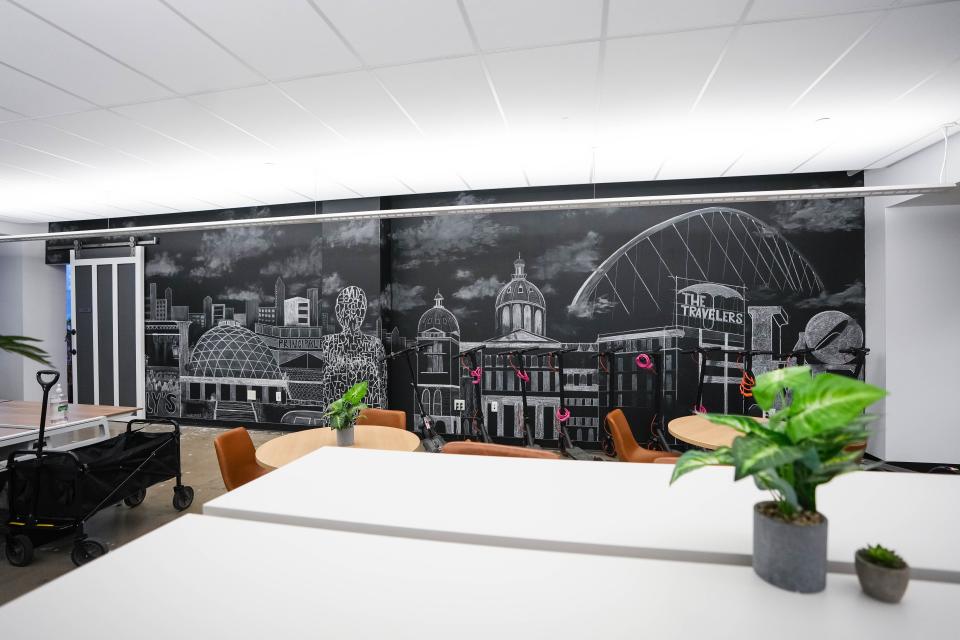Iowa telehealth startup OpenLoop plans massive downtown Des Moines expansion

On the fourth floor of the Bank of America Building, workers sipped seltzers and dipped chips under a ceiling-high banana tree and a pink neon light.
Many of the employees of Des Moines telehealth startup OpenLoop Health were meeting in person for the first time, explained CEO Dr. Jon Lensing. The company, with growing revenues and venture capital infusions, has rapidly expanded over the last year, increasing its headcount to 175 from 25.
“A lot of these people,“ Lensing said, looking at the gathering through a glass-walled office, “they only know each other from Zoom, being a predominately remote workforce. We had to grow at such a quick pace over the last year that a lot of employees we had to hire were remote. Now we’re trying to focus back down to Iowa.”
If Lensing can meet the goals he’s laid out, OpenLoop will evolve this year from buzzy tech startup to an important piece of the local economy. The Iowa Economic Development Authority awarded the company $500,000 in incentives on Jan. 20 as OpenLoop expands in the Bank of America Building at 317 Sixth Ave. in the heart of downtown. The city of Des Moines has preliminarily approved a $250,000 forgivable loan for the company.
The state assistance requires Lensing to hire 60 local workers, bringing the Des Moines total to about 100. But Lensing told the Register he plans to add 400 employees in Des Moines, potentially by the end of this year.
“My word for 2023 is just 'growth,'” he said.
As the company’s employees mingled, a construction worker stood two floors below under an open ceiling and dangling electrical wires. The worker ran a miter saw across a chunk of crown molding, breaking it down into a piece small enough to haul to the Dumpster.
More:Iowa startup hopes to revolutionize farming with 'swarm' of small, autonomous tractors
The building’s owner, Jeff Young, is working with a crew to prep about 13,000 square feet of second-floor space for OpenLoop’s new hires. It used to be occupied by a copying company and court stenographers. But those businesses left, in part due to the changing economic tides of COVID-19.
Out with the old ― and their crown molding.
Young’s crew is polishing concrete and knocking down walls to prepare for a more open office. By March 15, he hopes to turn the space over to Lensing, who signed a five-year lease.
Then it’s off to the third floor, about 10,000 square feet vacated by the Lillis O'Malley Olson Manning Pose Templeman law firm after 20 years. Young’s team will knock out more walls and polish more concrete for OpenLoop.
More:Downtown foot traffic approaching pre-pandemic levels, Des Moines Partnership leaders say
The company has not signed a lease for the third floor. But Lensing said he expects to lock that space down and start moving furniture into the old law firm space within six months.
Lensing 28, is making even bigger plans. Young said the CEO told him he hopes eventually to occupy 10 floors.
If so, a renaming might be in order. Young pointed out that Bank of America hasn’t occupied the Bank of America Building since before he purchased the property for $5.3 million in 2017.
“There’s a possibility,” Young said, “we would maybe call the building ‘OpenLoop.’”
Cooked up at a Hy-Vee café
In many ways, OpenLoop is the quintessential Iowa startup.
Lensing started brainstorming a business idea while he was at the University of Iowa medical school. He and his co-founder, Christian Williams, wanted to build an “Uber for health care,” matching physicians and nurses with providers who needed shifts filled.
Lensing enrolled at the university’s John Pappajohn Entrepreneurial Center. He and Williams spent their afternoons inside a Hy-Vee café in Iowa City, writing letters to recruit doctors to their service.

In 2020, they joined the first cohort of TechStars Iowa, the business accelerator program. They received backing from Iowa investors like Next Level Ventures, ISA Ventures and ManchesterStory.
The company launched its staffing application in 2020. But after an initial rush at the start of the pandemic, Lensing said providers lost interest in OpenLoop. While hospitals were desperate for nurses and others who could care for patients suffering from COVID-19, providers shut down less-pressing functions like elective surgeries.
More:How John Pappajohn Entrepreneurial Centers started 25 years ago with a $1 million check
Williams and Lensing began experimenting with telehealth in late 2020 and found more receptive customers. Over the last two years, backed by key government regulation changes, the company has built up its services.
OpenLoop continues to provide staffing, but now its focused on connecting clinicians who offer telehealth services to providers who want to increase their offerings. The company also offers software for clinicians that helps them book appointments, write prescriptions and keep notes on patients.
A division of the company handles paperwork to ensure that clinicians can provide health care in every state. Another division handles billing with insurers.

As many patients shifted to telehealth for the first time In the first months of the pandemic, Lensing said, providers saw a surge of behavioral health therapy appointments. Other popular categories included virtual urgent care and “convenience medicine” ― appointments to receive prescriptions for birth control or allergy medications.
“A lot of those kinds of services reached their peak,” Lensing said. “We’re starting to see more growth in specialized areas.”
He said OpenLoop has seen a surge of telehealth patients seeking hormone optimization, fertility consultations and diabetes treatments.
More:GOP lawmakers champion bill to cap medical malpractice damages. What that means for Iowans
According to Security and Exchange Commission filings, the company has raised about $19.7 million since February. In their application for state assistance, OpenLoop leaders said they will soon hire for positions ranging from developers to recruiters to marketers and clinicians.
In the last year, Lensing said, the roster of clinicians using OpenLoop has grown to 10,000 from 2,000. These include therapists, nurse practitioners and doctors. He said about 60,000 patients are using the service every month.
“If I had stayed in medicine, I’d be seeing 30 patients a day,” said Lensing, whose father also is a doctor. “Now, we’re seeing 60,000 a month. That’s incredible.”
Medicare reimbursement keyed telehealth growth
The pandemic ushered in the era of telehealth.
According to the Kaiser Family Foundation, about 13% of U.S. outpatient visits occurred over the Internet between March and August 2020, compared to practically none in the preceding six months.
As the pandemic waned, many patients returned to hospitals. Still, some liked staying home. From March through August 2021, 8% of outpatient visits occurred over the Internet.
Patients on government health care programs were particularly active. The number of Medicare visits conducted through telehealth increased to 52.7 million in 2020 from 840,000 the year before, according to the U.S. Department of Health and Human Services.

Before the pandemic, a patient had to meet several requirements before Medicare would reimburse a telehealth provider. The patient needed to be outside a metropolitan area. The patient needed to be located inside a provider’s office during the telehealth visit. The clinician had to be a doctor.
But when the pandemic began, federal regulators temporarily loosened those rules.
More:Rapid roll-out of telehealth services in Iowa: 'We're just going crazy with it,' one doctor says
Regulators particularly encouraged telemedicine for behavioral health. The U.S. Drug Enforcement Administration allowed clinicians to write prescriptions without seeing a patient in person, waiving a longtime requirement. The change was particularly important for opioid addicts who rely on drugs like suboxone and buprenorphine to satisfy cravings.
In December, Congress extended the pandemic-era telehealth rules through at least the end of 2024. Medicare will also begin reimbursing licensed marriage and family therapists and mental health counselors who meet with clients over the Internet next year.
“It’s a big change to encourage access and telehealth,” said Sunny Levine, a health care lawyer at Tampa, Florida-based Foley & Lardner.
Under an Iowa policy that took effect in March 2020, Medicaid reimburses providers for telehealth services at the same rate that it does for in-person services, said Katie Owens, the director of engagement at the Iowa Primary Care Association, a lobbying group for rural providers.
And in 2021, the Legislature passed a bill that requires commercial insurers to reimburse behavioral health therapists at the same rate whether they see patients in-person or online.

Reimbursement rates for other telehealth services depend on the contract between a provider and a commercial insurer. Spokespeople for MercyOne and UnityPoint Health declined to comment on how their reimbursement rates compare.
But, Owens said, “It’s often less.”
Added Lensing: “Because of the sheer size of Wellmark (Blue Cross Blue Shield), they do have a little bit lower reimbursement rates for some of the visits that we’re doing. But across the board, they’re very open to telemedicine.”
Asked about the insurer’s reimbursement rates for telehealth, Wellmark Chief Health and Innovation Officer Keith Shah said in a statement, “Wellmark is focused on the health and well-being of our members and ensuring that they get the right care at the right time, including virtual care. As the delivery of health care evolves, Wellmark constantly evaluates and modernizes the way we cover and pay for health care so that our members get the best, most effective care possible.”
Where do you find 400 workers in Iowa?
Iowa has a notoriously tight labor market, a frequent complaint among the state’s executives.
So meeting Lensing’s goal of adding 400 employees in Des Moines could prove tough. OpenLoop Senior Director of Marketing & Human Resources Jess Greiner said the company aggressively recruits, particularly on LinkedIn. The company has added workers from TruePill, a California-based health tech startup that cut jobs in four rounds in 2022.
More:Wells Fargo, Des Moines metro's top private employer, slashing mortgage business
“Our brand awareness has really boomed over the last year,” Greiner said.
“We try to be helpful,” Lensing said.

Williams, the company’s co-founder and chief operating officer, said OpenLoop’s executives have at times struggled to figure out what jobs they should hire for amid their torrid growth.
Executives realized they needed more trainers over the last year after bringing in a staff of 15 nurse practitioners. The team needed not only to train the nurse practitioners on OpenLoop’s protocols, Williams said, but also to teach them how to operate under the rules of about a dozen health care providers that OpenLoop staffs.
More:Dotdash Meredith to cut 274 jobs amid declining ad revenue
“We would have saved ourselves some headaches with hiring the right people four months before we hired the other people,” said Williams, 28. “But sometimes, you just get to a bubbling point, and the position appears.”
According to a business plan submitted to the IEDA, OpenLoop plans to upgrade its software this year. The company wants health care providers to be able to enroll in OpenLoop’s services faster. The process currently takes about seven weeks.
Executives also want to build a service that helps clinicians identify and share a patient’s potential co-morbidities with other specialists on the platform.
According to the presentation, OpenLoop plans to close another funding round in 2023.
“It’s a year of growth,” Lensing said. “And it’s a year to really cement and build a strong foundation on what we’ve created over the past 24 months.”
Tyler Jett covers jobs and the economy for the Des Moines Register. Reach him at tjett@registermedia.com, 515-284-8215, or on Twitter at @LetsJett.
This article originally appeared on Des Moines Register: As telehealth booms, OpenLoop prepares for big Des Moines expansion

